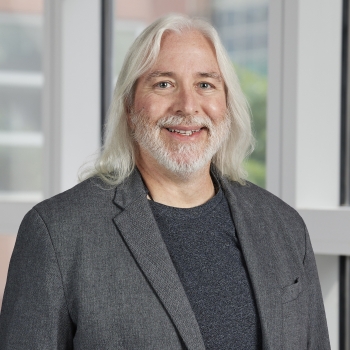Thomas J. Knobloch, MS, PhD
Associate Professor – Practice
Environmental Health Sciences

Biography
Dr. Knobloch is an National Cancer Institute-trained molecular biologist whose work emphasizes discovery of prognostic biomarkers of carcinogenic progression and predictive biomarkers for cancer prevention using early phase human clinical trials. His interest within the disease landscape emphasizes dietary and functional food intervention strategies impacting high at-risk mucosa (HARM), especialy the microenvironment of the oral cavity.
Populations of interest for his research include those at elevated risk from behavioral (smoking), occupational (firefighters), and environmental (harmful algal blooms cyanotoxins) exposures that contribute to higher risk of disease.
Most recently (2025), in work lead by Dr. Yael Vodovotz in Food Science and Technology with fellow Investigator Dr. Mark H. Weir in Environmental Health Sciences, Dr. Knobloch investigated the intersection of bioactive natural products derived from food processing “waste,” triple bottom line sustainability and beneficial health outcomes (President’s Research Excellence program, Accelerator Grant).
Education
- B.S. Biology
- Interdisciplinary Program in Neuroscience, John Carroll University
- M.S. Ichthyology Morphometrics and Diatom Phylogenetics
- John Carroll University
- Ph.D. Molecular
- Cellular and Developmental Biology, The Ohio State University
- NCI Fellowship in Molecular Carcinogenesis
Research interests
My research program includes several key interests:
- Characterizing malignant molecular progression of epithelial carcinogenesis in cancers associated with tobacco smoking, alcohol consumtion, and HPV infections (oral cancers, cervical cancers).
- The use of food-based interventions as implementable cancer risk-reduction strategies, with special emphasis on the bioactive phytochemicals present in black raspberries.
- The emerging role of bacterial cyanotoxins released during harmful algal blooms in the promotion of liver cancer in susceptible populations.
- Investigating the knowledge gap surrounding effective harm reduction and reducing cancer risk in firefighting personnel.
My work is fundamentally translational in nature and emphasizes the integrated participation of genomic (epigenetic, SNPs), transcriptional (expression signatures), metabolic (bioactive signaling cascades), and microbiomic (host-bacterial ecosystems) landscapes
Select publications
- Impact of Cyanotoxin Ingestion on Liver Cancer Development Using an At-Risk Two-Staged Model of Mouse Hepatocarcinogenesis. Mrdjen I, Lee J, Weghorst CM, Knobloch TJ. Toxins (Basel). 2022 Jul 14;14(7):484. doi: 10.3390/toxins14070484. PMID: 35878222
- Comparative Encapsulation Efficiency of Lutein in Micelles Synthesized via Batch and High Throughput Methods. Cosby LE, Lee KH, Knobloch TJ, Weghorst CM, Winter JO. Int J Nanomedicine. 2020 Oct 23;15:8217-8230. doi: 10.2147/IJN.S259202. eCollection 2020. PMID: 33122907
- Inherited alterations of TGF beta signaling components in Appalachian cervical cancers. Knobloch TJ, Peng J, Hade EM, Cohn DE, Ruffin MT 4th, Schiano MA, Calhoun BC, McBee WC Jr, Lesnock JL, Gallion HH, Pollock J, Lu B, Oghumu S, Zhang Z, Sears MT, Ogbemudia BE, Perrault JT, Weghorst LC, Strawser E, DeGraffinreid CR, Paskett ED, Weghorst CM. Cancer Causes Control. 2019 Oct;30(10):1087-1100. doi: 10.1007/s10552-019-01221-y. Epub 2019 Aug 21. PMID: 31435875
- Metabolic Regulation of Glycolysis and AMP Activated Protein Kinase Pathways during Black Raspberry-Mediated Oral Cancer Chemoprevention. Knobloch TJ, Ryan NM, Bruschweiler-Li L, Wang C, Bernier MC, Somogyi A, Yan PS, Cooperstone JL, Mo X, Brüschweiler RP, Weghorst CM, Oghumu S. Metabolites. 2019 Jul 11;9(7):140. doi: 10.3390/metabo9070140. PMID: 31336728
- Dietary administration of black raspberries modulates arsenic biotransformation and reduces urinary 8-oxo-2'-deoxyguanosine in mice. Tu P, Xue J, Bian X, Chi L, Gao B, Leng J, Ru H, Knobloch TJ, Weghorst CM, Lu K. Toxicol Appl Pharmacol. 2019 Aug 15;377:114633. doi: 10.1016/j.taap.2019.114633. Epub 2019 Jun 20. PMID: 31229487
- Characterization of the Functional Changes in Mouse Gut Microbiome Associated with Increased Akkermansia muciniphilaPopulation Modulated by Dietary Black Raspberries. Tu P, Bian X, Chi L, Gao B, Ru H, Knobloch TJ, Weghorst CM, Lu K. ACS Omega. 2018 Sep 30;3(9):10927-10937. doi: 10.1021/acsomega.8b00064. Epub 2018 Sep 10. PMID: 30288460
- Inhibition of Pro-inflammatory and Anti-apoptotic Biomarkers during Experimental Oral Cancer Chemoprevention by Dietary Black Raspberries. Oghumu S, Casto BC, Ahn-Jarvis J, Weghorst LC, Maloney J, Geuy P, Horvath KZ, Bollinger CE, Warner BM, Summersgill KF, Weghorst CM, Knobloch TJ. Front Immunol. 2017 Oct 23;8:1325. doi: 10.3389/fimmu.2017.01325. eCollection 2017. PMID: 29109723
- Suppression of Proinflammatory and Prosurvival Biomarkers in Oral Cancer Patients Consuming a Black Raspberry Phytochemical-Rich Troche. Knobloch TJ, Uhrig LK, Pearl DK, Casto BC, Warner BM, Clinton SK, Sardo-Molmenti CL, Ferguson JM, Daly BT, Riedl K, Schwartz SJ, Vodovotz Y, Buchta AJ Sr, Schuller DE, Ozer E, Agrawal A, Weghorst CM. Cancer Prev Res (Phila). 2016 Feb;9(2):159-71. doi: 10.1158/1940-6207.CAPR-15-0187. Epub 2015 Dec 23. PMID: 26701664
- Bioactive compounds or metabolites from black raspberries modulate T lymphocyte proliferation, myeloid cell differentiation and Jak/STAT signaling. Mace TA, King SA, Ameen Z, Elnaggar O, Young G, Riedl KM, Schwartz SJ, Clinton SK, Knobloch TJ, Weghorst CM, Lesinski GB. Cancer Immunol Immunother. 2014 Sep;63(9):889-900. doi: 10.1007/s00262-014-1564-5. Epub 2014 Jun 4. PMID: 24893859
- Somatic acquisition and signaling of TGFBR1*6A in cancer. Pasche B, Knobloch TJ, Bian Y, Liu J, Phukan S, Rosman D, Kaklamani V, Baddi L, Siddiqui FS, Frankel W, Prior TW, Schuller DE, Agrawal A, Lang J, Dolan ME, Vokes EE, Lane WS, Huang CC, Caldes T, Di Cristofano A, Hampel H, Nilsson I, von Heijne G, Fodde R, Murty VV, de la Chapelle A, Weghorst CM. JAMA. 2005 Oct 5;294(13):1634-46. doi: 10.1001/jama.294.13.1634. PMID: 16204663
Courses
- PUBHEHS 5315: Principles of Toxicology
- PUBHEHS 6310: Principles of Environmental Health Science
- PUBHEHS 7380: Exposure Science Monitoring Techniques I
- PUBHEHS 6390: Major Human Diseases in Global Public Health
- PUBHEHS 7899: Seminar in Environmental Health Sciences
- PUBHEPI 6411: Biological Basis of Public Health
- PUBHEPI 7830: Phytochemicals in Human Health: Crops to the Clinic
- PUBHEHS 7375: Quantitative Microbial Risk Analysis Modeling
- PUBHEHS 6340 Molecular Techniques for Environmental Health Sciences
- PUBHEHS 6382: Environmental Health Analytical Chemistry